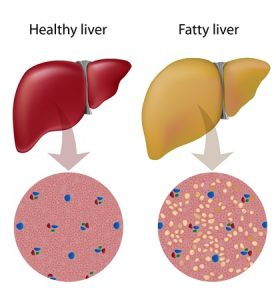
The topic of this article today is our liver and the role it plays in our hormone health. Many of us do not realize how important our liver health is when it comes to our hormones.
The liver has many roles in our body. It is our main detoxification organ, processing and removing harmful chemicals. It metabolizes our hormones, produces cholesterol, regulates our blood sugar, produces bile and is needed for optimum digestion.
Signs your liver may be sluggish include sensitivity to alcohol and/or caffeine, elevated “bad” LDL cholesterol, elevated triglycerides, bloating after meals (especially fatty meals), belching, heartburn, constipation, itchy skin or rashes, elevated liver enzymes, swollen feet and hormonal symptoms such as PMS, blood clots during your period, irregular periods and water retention before your period. Many of these symptoms may improve by optimizing liver health.

The liver is so important in our overall health but plays an integral role in hormone health. It processes all hormones including the sex hormones Estrogen, Progesterone and Testosterone. A woman can enter a state of Estrogen dominance if her liver is “sluggish”. Estrogen is metabolized in the liver and eliminated out of the body through the colon. If the liver is overwhelmed with toxins or is sluggish, the excess Estrogen is not metabolized or excreted properly. If constipation is also an issue, the extra hormones are reabsorbed and can cause havoc on a woman’s hormone cycle. This can create a state of Estrogen dominance and lead to symptoms of PMS such as moodiness, irritability, headaches, hot flashes and insomnia, irregular periods, heavy periods and water retention. Optimizing liver function and treating constipation should be a part of a comprehensive treatment plan for hormone disorders.
The great news is our liver can heal, regenerate and improve in how it detoxifies our body. Given the right diet, weight loss, stress management and some key supplements, we can improve our liver health!
The first place to start is weight loss. Belly fat is a big risk factor for a toxic, overwhelmed liver. Belly fat also significantly increases the risk of developing fatty liver. Exercise and clean diet and are key in losing that extra fat.
Eat organic food, avoid chemicals and pesticides in foods, avoid xenoestrogens found in plastic containers. Avoid or limit alcohol intake. Avoid processed foods that are high in fructose and corn syrup. Eat a diet that includes the “colors of the rainbow”, high in organic greens, vegetables and moderate fruit consumption.
There are two enzymatic pathways that are very important in how the liver processes hormones and detoxifies the body. The sulfation pathway involves the use of sulfur to detoxify. Eat a serving of cruciferous veggies daily including broccoli, cauliflower, cabbage, onion, leek and brussel sprouts. These foods will give the liver key nutrients to detoxify Estrogen. Taking glutathione is a great way to support sulfation and detoxification in the body.
The second pathways is methylation which is important in the processing and detoxification of chemicals. Foods rich in choline such as avocado, eggs and non GMO lecithin will help both methylation pathways and bile production in the liver. Vitamin B12 in the form of methylcobolamin is a great way to support methylation.
Optimize digestion to support healthy hormone balance. Tests such as a comprehensive digestive stool analysis and SIBO breath test can identify overgrowth of bacteria or yeast which is a source of toxins for the liver. They can also cause constipation or loose stools.
Lastly supplements such as NAC, milk thistle, berberine, magnesium and artichoke can support overall liver function and bile acid production.
Vitalia Health Care offers 2 programs to evaluate overall hormonal and digestive health. For more information please visit:
https://vitaliahealthcare.ca/lab-tests/female-hormone-assessment.html
Yours in health,
Dr Tasreen Alibhai, ND



